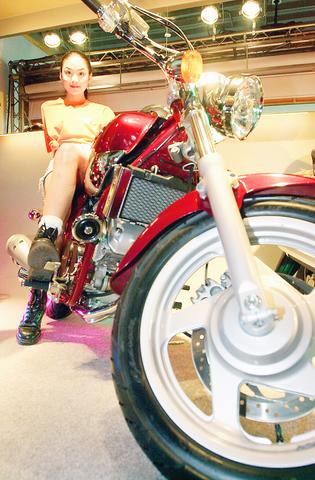Kwang Yang Motor Co (
The bikes have already proven market ready with the company shipping over 19,000 units abroad, mainly to Europe, over the last two years.
As for world-class brands such as Harley-Davison of the US and Kawasaki of Japan, big-bike enthusiasts may need to wait until early next year before they hit the road, a Kwang Yang executive said yesterday.

PHOTO: GEORGE TSORNG, TAIPEI TIMES
"Since imported brands still need to get through some government red tape on licensing and emission rules, they may not appear on the market until January or February," said Wang Son-chien (
Kwang Yang bikes have already passed Taiwan's emission and noise tests conducted by the Environmental Protection Administration, he said.
Taiwan outlawed the importation, use and registration of bikes larger then 125cc in 1982. But following the nation's accession into WTO earlier this year, three major motorcycle manufacturers -- Kwang Yang, Sanyang Industrial Co (
According to the Ministry of Economic Affairs, it is estimated that domestic demand for larger bikes will reach around 20,000 units annually, with total sales of between NT$3 billion and NT$4 billion.
"But because of new government regulations which ban bigger bikes from operating on highways and in car-only lanes, we predict that demand will reach only 12,000 units a year," Wang said.
If the government scraps the road-use regulation, the demand for bigger bikes may surge up to 30,000 units a year, Wang said.
Kwang Yang expects to grab at least a 30-percent share of the domestic market, on sales of 30 bikes a month or more, he said.
In addition, Kwang Yang is in talks with Harley-Davison and Kawasaki in an effort to import their 450cc-and-above bikes into Taiwan, spokesman Chen Fu-an (陳福安) said.
Sanyang is also in talks with Harley, according to company spokesman Yeh Feng-ming (葉峰明).
"We are discussing being the general sales agent for Harley-Davison, but we are also in talks with Aprilia [motorcycles] of Italy."
Sanyang is currently conducting noise and emisson tests on its bigger bikes and is planning to launch a 180cc model sometime in September, Yeh said.

Merida Industry Co (美利達) has seen signs of recovery in the US and European markets this year, as customers are gradually depleting their inventories, the bicycle maker told shareholders yesterday. Given robust growth in new orders at its Taiwanese factory, coupled with its subsidiaries’ improving performance, Merida said it remains confident about the bicycle market’s prospects and expects steady growth in its core business this year. CAUTION ON CHINA However, the company must handle the Chinese market with great caution, as sales of road bikes there have declined significantly, affecting its revenue and profitability, Merida said in a statement, adding that it would

Greek tourism student Katerina quit within a month of starting work at a five-star hotel in Halkidiki, one of the country’s top destinations, because she said conditions were so dire. Beyond the bad pay, the 22-year-old said that her working and living conditions were “miserable and unacceptable.” Millions holiday in Greece every year, but its vital tourism industry is finding it harder and harder to recruit Greeks to look after them. “I was asked to work in any department of the hotel where there was a need, from service to cleaning,” said Katerina, a tourism and marketing student, who would

i Gasoline and diesel prices at fuel stations are this week to rise NT$0.1 per liter, as tensions in the Middle East pushed crude oil prices higher last week, CPC Corp, Taiwan (台灣中油) and Formosa Petrochemical Corp (台塑石化) said yesterday. International crude oil prices last week rose for the third consecutive week due to an escalating conflict between Israel and Iran, as the market is concerned that the situation in the Middle East might affect crude oil supply, CPC and Formosa said in separate statements. Front-month Brent crude oil futures — the international oil benchmark — rose 3.75 percent to settle at US$77.01

RISING: Strong exports, and life insurance companies’ efforts to manage currency risks indicates the NT dollar would eventually pass the 29 level, an expert said The New Taiwan dollar yesterday rallied to its strongest in three years amid inflows to the nation’s stock market and broad-based weakness in the US dollar. Exporter sales of the US currency and a repatriation of funds from local asset managers also played a role, said two traders, who asked not to be identified as they were not authorized to speak publicly. State-owned banks were seen buying the greenback yesterday, but only at a moderate scale, the traders said. The local currency gained 0.77 percent, outperforming almost all of its Asian peers, to close at NT$29.165 per US dollar in Taipei trading yesterday. The